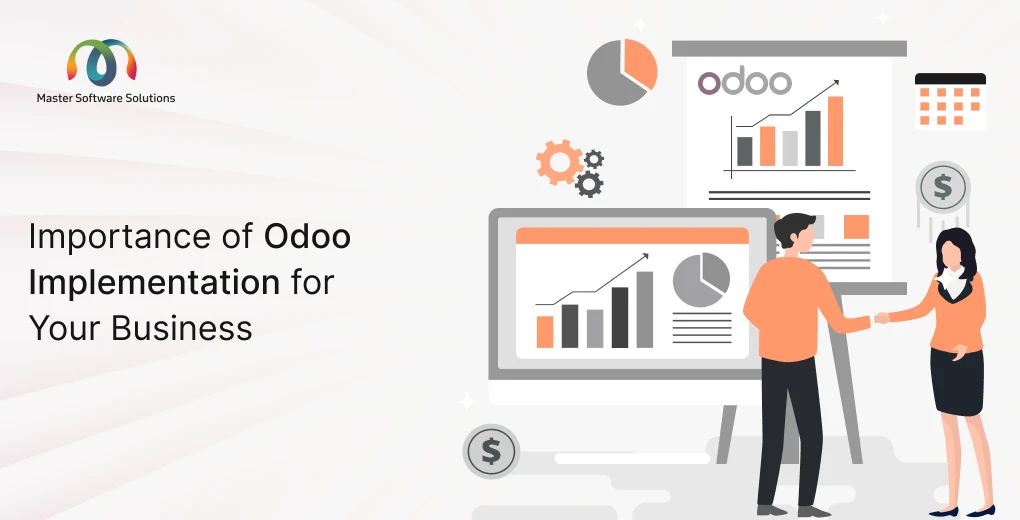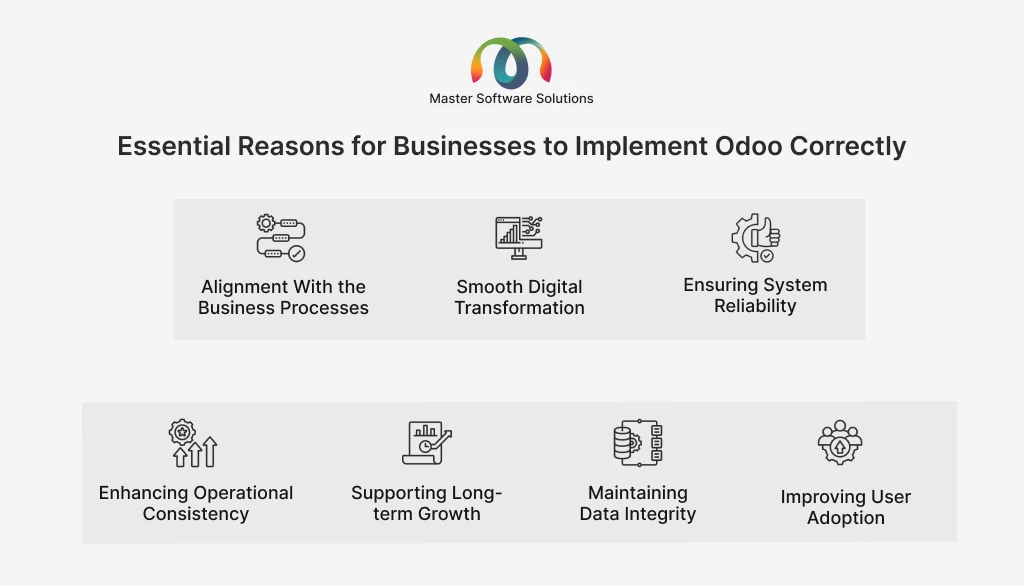Enterprise resource planning solutions have become essential for businesses to streamline operations, enhance coordination, and support strategic decision-making. It helps companies unify their processes and maintain control over day-to-day operations.
Odoo ERP is a powerful, modular, and fully integrated business management platform designed to support companies of all sizes. Odoo offers a wide range of applications covering everything from sales and accounting to inventory, HR, and manufacturing. This centralized system can adapt to diverse operational needs.
However, the value of Odoo ERP software can be realized when it is correctly implemented. Proper Odoo ERP implementation ensures the system is aligned with the organization’s structure, workflows, and objectives. It also lays the foundation for smooth operations, user acceptance, accurate data handling, and long-term scalability. Without a well-planned and executed implementation process, even the most advanced ERP can fall short of expectations.
Table of Contents
Understanding Odoo implementation
Odoo implementation is the process of configuring, customizing, and deploying the Odoo ERP system to align with a company’s specific operational needs. Odoo offers a wide range of applications, so the platform must be carefully configured to ensure that each module works seamlessly with the company’s existing processes. Here is what an Odoo implementation typically includes:
Identifying business needs: Understanding how your business works and what processes you want Odoo to support.
Selecting the right module: Choosing the Odoo apps that match your requirements, such as sales, inventory, accounting, HR, etc.
Configuring the system: Setting up features, workflows, and settings so they align with your business processes.
Customizing when needed: Making adjustments or adding new features to meet unique business needs.
Integrating with other tools: Connecting Odoo with platforms like e-commerce sites, payment systems, or logistics applications.
Migrating existing data: Safely transferring customer details, product lists, transactions, and other important information into Odoo.
Setting user roles and permissions: Ensuring each employee has access only to the parts of the system they need.
Training your team: Helping users understand how to use Odoo effectively in their daily work.
Importance of implementing Odoo the right way
Implementing Odoo correctly is essential because it ensures the system truly fits your business operations. A proper setup helps avoid errors, confusion, and disruptions in daily work. It also creates a smooth workflow across departments and makes the system reliable for long-term use. When Odoo is implemented correctly, your team can work more confidently and your business can grow without technical obstacles. Here are the essential reasons for implementing Odoo correctly.
Alignment with the business processes
Aligning Odoo with your business processes means configuring the system to match your organization’s operations. Every business has its own workflow: how orders are handled, how inventory is managed, how approvals are done, and how information moves between teams. During implementation, these workflows are carefully analyzed so Odoo can be configured to support the team, rather than forcing you to change everything just to fit the software.
When Odoo is aligned with your processes, tasks become easier, information flows smoothly, and employees can continue working in a way that feels natural to them. This reduces confusion, minimizes errors, and ensures that the system truly supports your daily operations.
Smooth digital transformation
A smooth digital transformation means shifting from manual work or outdated systems to modern digital tools without disrupting your day-to-day operations. When Odoo is implemented properly, this transition becomes easier and more organized. The system brings all your business data, processes, and teams into one unified platform, helping you move away from scattered spreadsheets and disconnected software.
With a well-planned implementation, your team adapts faster, workflows become more structured, and operations continue without major interruptions. This makes the digital shift feel natural and manageable, allowing your business to modernize step by step while staying productive.
Ensuring system reliability
System reliability means that Odoo runs smoothly and consistently, without disrupting your operations. Proper implementation plays a major role in achieving this. When Odoo is set up correctly, with accurate configurations, clean data, and well-structured workflows, the system performs correctly, reducing crashes, errors, and delays.
Because they are confident in the accuracy and timeliness of the information they view, a dependable system also fosters employee trust in the platform. This stability allows your business to operate confidently, make decisions based on reliable data, and avoid costly interruptions or downtime. In short, good implementation ensures Odoo becomes a strong and steady backbone for your business operations.
Enhancing operational consistency
Enhancing operational consistency means making sure that every department in your business follows the same structured process every time. When Odii is implemented correctly, it creates standardized workflows that guide how tasks are performed, whether it’s handling inventory, managing accounts, or tracking customer interactions. This reduces confusion and prevents employees from using different methods or tools to complete the same tasks.
Information remains accurate, teamwork gets better, and the organization as a whole runs more smoothly and predictably when operations are consistent. This uniformity also makes training easier and helps your business maintain a high level of quality in daily activities.
Supporting long-term growth
Supporting long-term growth means ensuring that your business can expand smoothly without facing system limitations. When Odoo is properly implemented, it creates a strong foundation that can adapt as your business grows, whether you’re adding new products, opening new locations, or expanding your customer base. Odoo’s modular architecture enables you to activate new features or departments whenever needed, without rebuilding the system from scratch.
A well-planned implementation also ensures that your processes remain scalable, your data stays organized, and your operations can handle increased demand. This makes it simpler for your company to expand sustainably while maintaining control and efficiency.
Also Read: Odoo ERP Implementation: Ultimate Guide 2026
Maintaining data integrity
Maintaining data integrity means ensuring that all the information stored in Odoo is accurate, complete, and consistent across the system. Proper implementation plays a key role in this by guiding how data is migrated, organized, and managed during setup. When customer details, product records, financial entries, and inventory information are transferred correctly, the system prevents errors that could affect daily operations.
A well-implemented system also ensures that data is not duplicated, misplaced, or corrupted. Clear structures, controlled user permissions, and standardized input methods keep the information clean and reliable. With strong data integrity, your team can make decisions confidently, avoid costly mistakes, and maintain smooth business operations.
Improving user adoption
This involves helping your team feel comfortable and confident using Odoo in their daily work. Even the best system can fail if employees don’t understand how to use it or find it difficult to navigate. Proper implementation includes clear training, guided onboarding, and defining user-friendly workflows that align with how employees already work.
When users understand the system, they are more likely to use it correctly and consistently. This reduces mistakes, increases productivity, and ensures that the business gets the full value of the Odoo platform. When employees are introduced to Odoo in a smooth and supportive way, they are encouraged to embrace change rather than resist it.
Role of a professional Odoo implementation partner
A professional Odoo implementation partner plays an important role in ensuring the success of your ERP project. Their expertise helps your business avoid mistakes and achieve a smooth, effective setup. Overall, a professional implementation partner provides the knowledge, planning, and support needed to make your Odoo project successful from start to finish. Here’s how they contribute.
Understanding your requirements: They analyze your business processes to identify what you truly need from Odoo.
Selecting and configuring modules: They help you choose the right Odoo apps and set them up correctly to match your workflows.
Providing expert customization: When your business needs something unique, they customize Odoo without breaking system stability.
Handling data migration safely: They transfer your existing data into Odoo accurately and securely.
Ensuring smooth integrations: They connect Odoo with other tools you use, such as e-commerce, payment systems, and logistics solutions.
Offering training and support: They guide your team, answer questions, and help users get comfortable with the system.
Preventing costly errors: This experience helps avoid misconfigurations and issues that could disrupt your operations.
Common risks when Odoo is not implemented properly
Improper Odoo implementation can lead to several problems that affect daily operations and overall business performance. In addition to preventing your company from reaping the full benefits of Odoo, this could result in new issues rather than their resolution. Some of the common risks include:
Operational disruptions: Incorrect setups can slow down processes, cause system errors, or interrupt workflows.
Data inconsistencies: Inaccurate, redundant, or missing information can result from poor data migration or incorrect configurations.
Lower user adoption: If the system is confusing or not aligned with actual workflows, employees may avoid using it.
Inefficient workflows: Misconfigured modules can create unnecessary steps, slowing down business operations.
Higher long-term costs: Fixing errors, redoing setup, or dealing with system downtime often results in extra expenses.
Integration failures: If third-party integrations are not handled correctly, data might not sync correctly, causing delays and errors.
Conclusion
Implementing Odoo correctly is essential for ensuring your business runs smoothly, efficiently, and confidently. A well-planned setup aligns the system with your workflows, maintains clean and reliable data, supports employee adoption, and creates a solid foundation for long-term growth. On the other hand, poor implementation can lead to disruptions, confusion, and unnecessary costs.
By understanding the importance of proper implementation and working with experienced professionals, you can explore Odoo and ensure it becomes a powerful tool that supports your business at every stage.
Master Software Solutions is a certified Odoo implementation partner who provides end-to-end Odoo services, including odoo consulting services, implementation, migration, development, configuration, customizations, and ongoing support and maintenance. If you are a business looking to implement the Odoo ERP system, contact us and see how we can help!

